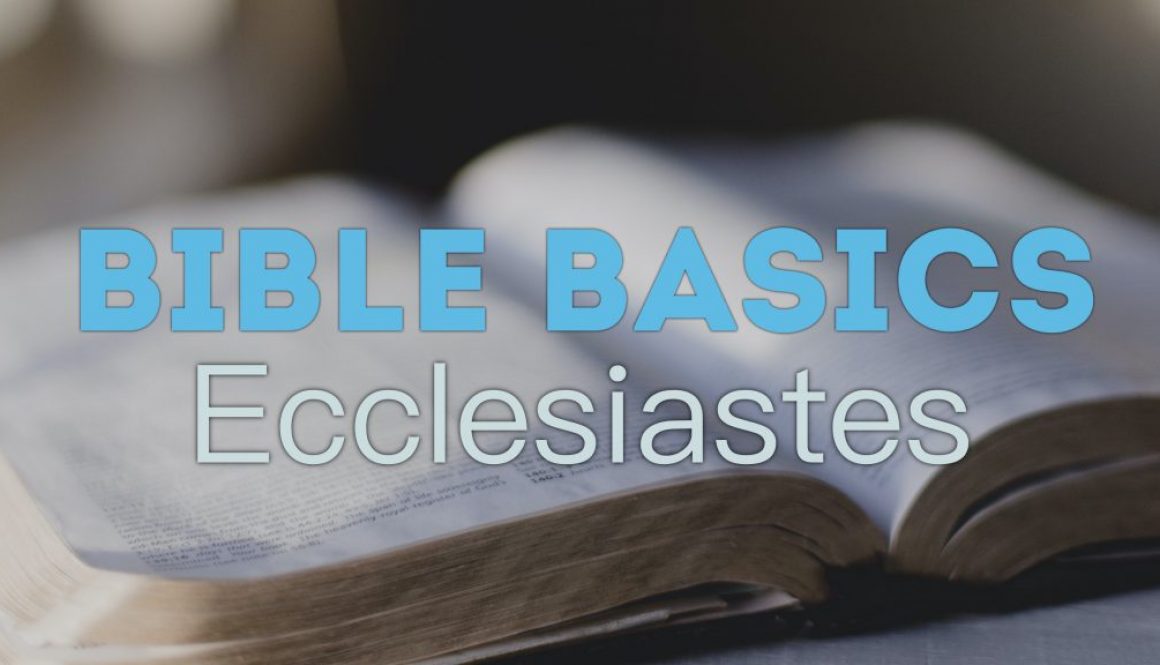Ecclesiastes
Author
Although the author only refers to himself as “the preacher, the son of David” in 1:1, there are many other evidences in the book that the author was King Solomon, including the author’s great wisdom (1:16), his mass of wealth (2:8), his building projects (2:4-6), and his discussion of his collection of proverbs (12:9-14).
Date
The book of Ecclesiastes was likely written between 940 and 931 B.C., near the end of Solomon’s reign.
Audience and Purpose
Ecclesiastes was written to God’s people to answer the question, “does life have meaning?”
Major Themes
- Brevity of Life.
- Wealth. The author amasses enormous wealth, but determines that it is “vanity.”
- Human Pleasure. The author amasses thousands of women (wives and concubines), but determines that it, too, is “vanity.”
- Wisdom and Human Intellect.
Key Scriptures
- Ecclesiastes 1:2 — “Vanity of vanities, says the Preacher, vanity of vanities! All is vanity.”
- Ecclesiastes 3:1 — “For everything there is a season, and a time for every matter under heaven”
Outline
- Ecclesiastes 1:1-3 — Introduction
- Ecclesiastes 1:4-2:26 — First List of Vanities
- Ecclesiastes 3:1-8 — A Poem: “For Everything There Is A Season”
- Ecclesiastes 3:9-15 — The Humility of Man Before God
- Ecclesiastes 3:16-4:16 — Second List of Vanities
- Ecclesiastes 5:1-7 — Fear and Honor God
- Ecclesiastes 5:8-12:7 — Wisdom for Life “Under the Sun”
- Ecclesiastes 12:8-14 — Conclusion
Gospel Summary
The book of Ecclesiastes might well be considered humanity’s greatest test of all that life has to offer. King Solomon spent his life throwing lavish parties, accumulating wealth, growing in wisdom and knowledge, and exploring all the sensualities of the flesh. However, at the end of the day, his findings came down to this: life is but a fleeting moment of time, and in comparison to eternity, all of life’s pleasures and accomplishments on earth are “vanity.” His concluding words in the book, summarize this succinctly: “The end of the matter; all has been heard. Fear God and keep his commandments, for this is the whole duty of man. For God will bring every deed into judgment, with every secret thing, whether good or evil” (Ecclesiastes 12:13-14).
The whole experiment that is Ecclesiastes brings about one conclusion, we must obey God and live for Him. Of course, the rest of the Old Testament continues to build the case that no matter how hard we try, we are incapable of doing that without the Messiah – Jesus – who is to come.
© Anthony Scott Ingram 2020. All Rights Reserved.
Photo by Carolyn V on Unsplash
Unless otherwise indicated, all Scripture quotations are from The Holy Bible, English Standard Version®, copyright © 2001 by Crossway Bibles, a publishing ministry of Good News Publishers. Used by permission. All rights reserved.”
Please note that I do get a small kickback from Amazon for any purchases made using the links on this post. Should you choose to purchase from them, I just want to say thank you for further supporting my work in ministry!
